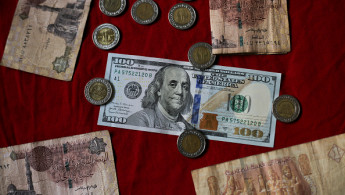Egyptian expatriates' remittances drop by 26.1 per cent amid new saving options
At a time when the Egyptian economy has been undergoing an unforgiving economic crisis and a shortage of foreign currency, the country's expatriates' remittances have dropped by 26.1 per cent, which seemed to have led the government to take measures in a bid to attract more inflows of the green currency.
The remittances of Egyptians working abroad amounted to only US$17.5 billion in the first three quarters of 2022/2023, compared to US$23.6 billion in the same period in the previous fiscal year, local news outlets reported this week, citing the Central Bank of Egypt (CBE).
The expatriates' transfers represent a primary foreign currency source for the country that has already been straining its foreign reserves.
The state-owned National Bank of Egypt and Banque Misr, the country's two major banks where most of the citizens' savings are kept, have, meanwhile, issued two US dollar-denominated annual-yield certificates of deposit (CD) in what seemed to be an attempt to attract more inflows into the country.
The first CD, called "Al Ahly Plus," offers a seven per cent annual yield whereby its holders can secure a loan for investment purposes up to 50 per cent of the total value, with a cap of EGP 10 million with a 2.25 per cent interest rate.
The second CD, "Al Ahly Fawran," presents an even higher annual yield of nine per cent. But unlike the "Al Ahly Plus," the yield for this CD can be disbursed in advance to the holders in Egyptian pounds throughout the three years, amounting to 27 per cent of its total value.
Banque Misr has offered similar CDs with the same maturity and annual yields.
Egyptians can no longer acquire dollars from banks or currency exchange offices, which led many to refrain from having accounts in US dollars in national banks. Several clients of national banks told The New Arab that they were obligated to receive their US-dollar withdrawals in the local currency instead.
The economic crisis has further forced the government to look for new sources of foreign currency, including touting the sale of state assets to wealthy Gulf nations.
Also this week, the International Monetary Fund (IMF) raised its projections for Egypt's inflation in 2023 and 2024 to 24.4 per cent and 32 per cent, respectively, up from 21.6 per cent in 2023 and 18 per cent in 2024 as projected in April, according to Deputy Director of the Research Department Petya Koeva Brooks.
Brooks attributed these projections mainly to the depreciation of the Egyptian pound against the US dollar, local state-run Al-Ahram reported.
In October 2022, the CBE imposed an exchange rate flexibility, allowing the value of the Egyptian pound to be regulated by market forces to save an already ailing economy after securing a US$3 billion loan from the IMF.
One US dollar is valued at 30.95 EGP at the time of publishing. In contrast, it amounts to about 38 pounds in the parallel, informal market, which led many to keep their foreign currency away from banks and exchange them informally instead.





 Follow the Middle East's top stories in English at The New Arab on Google News
Follow the Middle East's top stories in English at The New Arab on Google News


